-
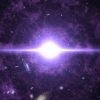 +13 +1
+13 +1What happened before the Big Bang?
In the beginning, there was an infinitely dense, tiny ball of matter. Then, it all went bang, giving rise to the atoms, molecules, stars and galaxies we see today. Or at least, that's what we've been told by physicists for the past several decades.
-
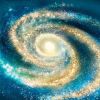 +16 +1
+16 +1Scientists link an odd reaction to a barrier in the center of the Milky Way
Researchers found a dip in the otherwise uniform density of cosmic rays at the center of the Milky Way.
-
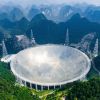 +21 +1
+21 +1China's FAST Telescope Could Detect Self-Replicating Alien Probes
One of the most challenging questions to answer when confronting the Fermi Paradox is why exponentially scaling technologies haven’t taken over the universe by now. Commonly known as von Neumann probes, the idea of a self-replicating swarm of extraterrestrial robots has been a staple of science fiction for decades. But so far, there has never been any evidence of their existence outside the realm of fiction.
-
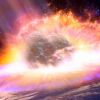 +17 +1
+17 +1The chance events that led to human existence
How have we ended up as the most advanced species on a small blue-green planet, orbiting a seemingly insignificant star, in one of the hundred billion galaxies in the Universe? Science has found some extraordinary answers to this question. Looking back through time, it appears that our existence depends on an apparently unlikely sequence of cosmic moments.
-
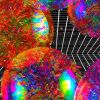 +18 +1
+18 +1Thousands of physicists are working together to redefine the cosmos
What happened at the beginning of the universe, in the very first moments? The truth is, we don’t really know because it takes huge amounts of energy and precision to recreate and understand the cosmos on such short timescales in the lab.
-
 +20 +1
+20 +1A Bitter Archaeological Feud Over an Ancient Vision of the Cosmos
The Nebra sky disk, which has been called the oldest known depiction of astronomical phenomena, is a “very emotional object.”
-
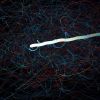 +10 +1
+10 +1Particle Sandbox - Gravity Simulator
Grand-scale Newtonian physics gravity simulator.
-
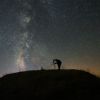 +13 +1
+13 +1An ‘impossible’ discovery of ‘twisted light’ could rewrite laws of physics
The findings could shed light on dark matter and dark energy
-
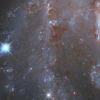 +14 +1
+14 +1The Hubble Telescope caught a supernova outshining every star in its galaxy
The Hubble Space Telescope got a rare look at one of the most awesome light shows in the universe, catching a supernova that outshone every star in its galaxy.
-
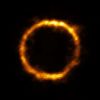 +14 +1
+14 +1Why is there a normal galaxy sitting at the edge of the Universe?
Aided by a trick of gravity, astronomers have found a normal galaxy. Big deal, right? The thing is, where they found it is not normal: The light we see from it left the galaxy 12.4 billion years ago, meaning we’re seeing it as it was when the Universe itself was only 1.4 billion years old! That’s what makes this so weird. A normal galaxy has no business being there when the cosmos was so young. But yet, there it sits.
-
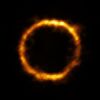 +38 +1
+38 +1Scientists Found a Lookalike of Our Own Galaxy Deep in Cosmic Time
12 billion light years from Earth, scientists spotted a galaxy that is the spitting image of a young Milky Way. Its discovery challenges our understanding of the early universe.
-
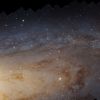 +6 +1
+6 +1Why it’s time to take alternatives to dark matter seriously
In 1969, the American astronomer Vera Rubin puzzled over her observations of the sprawling Andromeda Galaxy, the Milky Way’s biggest neighbour. As she mapped out the rotating spiral arms of stars through spectra carefully measured at the Kitt Peak National Observatory and the Lowell Observatory, both in Arizona, she noticed something strange: the stars in the galaxy’s outskirts seemed to be orbiting far too fast. So fast that she’d expect them to escape Andromeda and fling out into the heavens beyond. Yet the whirling stars stayed in place.
-
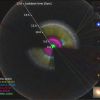 +3 +1
+3 +1Astrophysicists fill in 11 billion years of the universe's expansion history
The Sloan Digital Sky Survey (SDSS) released today a comprehensive analysis of the largest three-dimensional map of the universe ever created, filling in the most significant gaps in our possible exploration of its history.
-
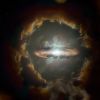 +17 +1
+17 +1The oldest disk galaxy yet found formed more than 12 billion years ago
The oldest disk-shaped galaxy ever spotted formed just 1.5 billion years after the Big Bang, a new study finds. That’s much earlier than astronomers thought that this type of galaxy could form. Previous observations show that disk-shaped galaxies — including sprawling, spiral systems like the Milky Way — didn’t show up in large numbers until between 3 billion and 4 billion years after the Big Bang, which occurred about 13.8 billion years ago.
-
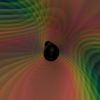 +19 +1
+19 +1This Black-Hole Collision Just Made Gravitational Waves Even More Interesting
An unprecedented signal from unevenly sized objects gives astronomers rare insight into how black holes spin
-
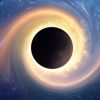 +21 +1
+21 +1Black holes shouldn't echo, but this one might. Score 1 for Stephen Hawking?
This isn't how black holes are supposed to behave.
-
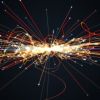 +2 +1
+2 +1What’s Wrong with Physics
A physicist slams hype about multiverses, string theory, and quantum computers and calls for more diversity in his field
-
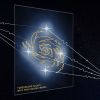 +21 +1
+21 +1Hubble detects smallest known dark matter clumps
When searching for dark matter, astronomers must go on a sort of "ghost hunt." That's because dark matter is an invisible substance that cannot be seen directly. Yet it makes up the bulk of the universe's mass and forms the scaffolding upon which galaxies are built. Dark matter is the gravitational "glue" that holds galaxies as well as galaxy clusters together. Astronomers can detect its presence indirectly by measuring how its gravity affects stars and galaxies.
-
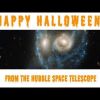 +20 +1
+20 +1Hubble's Scary New Halloween Image
NASA’s Hubble Space Telescope has unveiled a spooky new image staring out from the depths of the cosmos. The new image reveals the twin galaxies AM 2026-424 — a pair of interacting galaxies that may foreshadow our Milky Way’s own frightening fate.
-
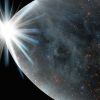 +21 +1
+21 +1Putting the “bang” in the Big Bang
As the Big Bang theory goes, somewhere around 13.8 billion years ago the universe exploded into being, as an infinitely small, compact fireball of matter that cooled as it expanded, triggering reactions that cooked up the first stars and galaxies, and all the forms of matter that we see (and are) today.
Submit a link
Start a discussion




















